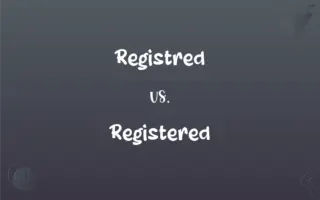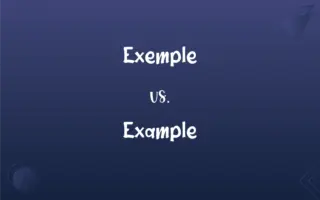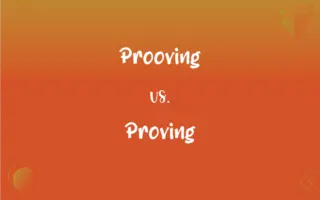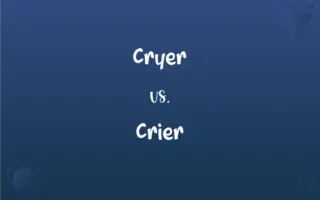Trate vs. Trait: Mastering the Correct Spelling
Edited by Aimie Carlson || By Janet White || Updated on March 8, 2024
"Trate" is an incorrect spelling, while "trait" is correct. A trait is a distinguishing quality or characteristic, typically belonging to a person.
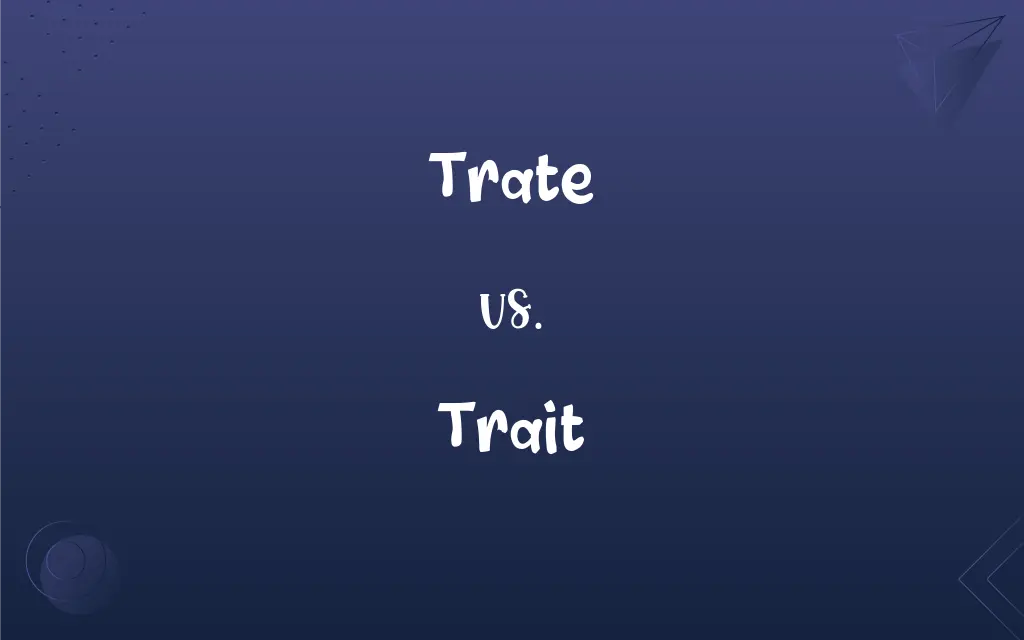
Which is correct: Trate or Trait
How to spell Trait?

Trate is Incorrect

Trait is Correct
ADVERTISEMENT
Key Differences
Visualize "trait" with the 'ai' highlighted to differentiate it from "trate".
Use a rhyme like, "In 'trait', 'ai' is straight."
Pronounce "trait" to emphasize the 'ai' sound.
Associate "trait" with 'portrait', both containing 'rait'.
Remember that "trait" has 'ai', like in 'characteristic'.
ADVERTISEMENT
Correct usage of Trait
Her artistic trate was evident in her work.
Her artistic trait was evident in her work.
She admired his positive trate.
She admired his positive trait.
His unique trate makes him stand out.
His unique trait makes him stand out.
A common trate among successful people is resilience.
A common trait among successful people is resilience.
Trait Definitions
Trait refers to a biological feature or behavior.
The bird's bright plumage is a mating trait.
Trait denotes a characteristic common to a group.
Adaptability is a key trait of successful entrepreneurs.
Trait can mean a genetically inherited feature.
Blue eyes are a dominant trait in their family.
Trait refers to a distinguishing personality quality.
Her most notable trait is her kindness.
Trait also means an attribute that identifies an individual.
His punctuality was a well-known trait.
A distinguishing feature, as of a person's character.
A morphological, physiological, or behavioral feature of an organism.
(Archaic) A short line or mark made with a writing or drawing implement.
An identifying characteristic, habit or trend.
The number one personality trait I hate is hypocrisy. Why can't you be consistent!?
(object-oriented) An uninstantiable collection of methods that provides functionality to a class by using the class’s own interface.
Traits are somewhat between an interface and a mixin.
A stroke; a touch.
By this single trait Homer makes an essential difference between the Iliad and Odyssey.
A distinguishing or marked feature; a peculiarity; as, a trait of character.
A distinguishing feature of your personal nature
Trait Sentences
A trait is a characteristic or quality that someone or something has.
Having a sense of humor is an attractive trait in a person.
Leaders often possess the trait of decisiveness.
The trait of perseverance can help you achieve your goals.
Creativity is a trait that many artists share.
Curiosity is a trait that can lead to lifelong learning.
Patience is a trait that can be very beneficial in life.
Empathy is an important trait for caregivers to have.
A sense of responsibility is a key trait for success.
Integrity is a highly valued trait in many cultures.
Adaptability is a useful trait in today's fast-changing world.
Being trustworthy is a trait that strengthens relationships.
The ability to communicate effectively is a crucial trait.
Generosity is a trait that can bring happiness to others.
FAQs
What is the root word of trait?
The root word of "trait" is the Middle French word 'trait', meaning a stroke or feature.
Why is it called trait?
"Trait" is derived from Middle French 'trait', meaning a stroke, line, or feature.
Which vowel is used before trait?
Commonly, the vowel 'a' as in "a trait".
What is the singular form of trait?
The singular form is "trait".
What is the verb form of trait?
There is no verb form of "trait"; it is solely a noun.
What is the pronunciation of trait?
Trait is pronounced as /treɪt/.
Is trait a noun or adjective?
"Trait" is a noun.
Is trait an adverb?
No, "trait" is not an adverb.
What is the plural form of trait?
The plural form is "traits".
Which preposition is used with trait?
Prepositions like 'of', 'in', and 'with' are used with "trait".
Which article is used with trait?
Both definite ('the') and indefinite ('a', 'an') articles are used with "trait".
Is trait a negative or positive word?
"Trait" is neutral; it is neither inherently negative nor positive.
Is trait a countable noun?
Yes, "trait" is a countable noun (e.g., several traits).
How many syllables are in trait?
There is one syllable in "trait".
Which determiner is used with trait?
Determiners like 'this', 'that', 'some', 'any' are used with "trait".
Which conjunction is used with trait?
Conjunctions such as 'and', 'or', 'but' can be used with "trait".
What is the third form of trait?
Similarly, there is no third form for the noun "trait".
Is trait a vowel or consonant?
"Trait" is a word, not a vowel or consonant.
Is the trait term a metaphor?
"Trait" can be used metaphorically, but it is not inherently a metaphor.
Is the word trait imperative?
No, "trait" is not imperative; it's a noun.
What is a stressed syllable in trait?
The entire word "trait" is stressed, as it is monosyllabic.
What part of speech is trait?
"Trait" is a noun.
What is the opposite of trait?
There isn't a direct opposite of "trait", but "uncharacteristic" can be used in contrasting contexts.
What is the first form of trait?
The first form is "trait", as it is a noun.
Is trait an abstract noun?
Yes, "trait" is an abstract noun, representing an intangible quality.
Is trait a collective noun?
No, "trait" is not typically used as a collective noun.
How do we divide trait into syllables?
Trait is a single-syllable word and is not divided.
What is another term for trait?
Another term for trait is "characteristic" or "attribute".
What is the second form of trait?
There is no second form, as "trait" is only a noun.
How is trait used in a sentence?
Example: "Empathy is an important trait for a counselor to have."
About Author
Written by
Janet WhiteJanet White has been an esteemed writer and blogger for Difference Wiki. Holding a Master's degree in Science and Medical Journalism from the prestigious Boston University, she has consistently demonstrated her expertise and passion for her field. When she's not immersed in her work, Janet relishes her time exercising, delving into a good book, and cherishing moments with friends and family.
Edited by
Aimie CarlsonAimie Carlson, holding a master's degree in English literature, is a fervent English language enthusiast. She lends her writing talents to Difference Wiki, a prominent website that specializes in comparisons, offering readers insightful analyses that both captivate and inform.
